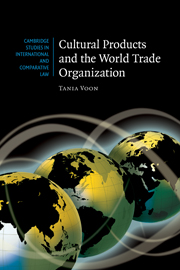Book contents
- Frontmatter
- Contents
- Detailed chapter outline
- Table of GATT/WTO agreements
- Table of GATT/WTO cases
- Table of abbreviations
- Foreword
- Acknowledgements
- Part I Stalemate and its ideological origins
- Part II Options for the future
- 4 Resolution through dispute settlement and international law
- 5 Constructing a new agreement outside the WTO
- 6 Improving the existing WTO agreements
- 7 Conclusion
- Bibliography
- Index
6 - Improving the existing WTO agreements
Published online by Cambridge University Press: 23 February 2010
- Frontmatter
- Contents
- Detailed chapter outline
- Table of GATT/WTO agreements
- Table of GATT/WTO cases
- Table of abbreviations
- Foreword
- Acknowledgements
- Part I Stalemate and its ideological origins
- Part II Options for the future
- 4 Resolution through dispute settlement and international law
- 5 Constructing a new agreement outside the WTO
- 6 Improving the existing WTO agreements
- 7 Conclusion
- Bibliography
- Index
Summary
Clearly a middle ground must be found whereby the legitimate cultural needs of a country can be attained with a minimum of impact on international trade and investment flows … [I]t is unreasonable for countries to demand carte blanche to promote and protect their cultural industries. But it is also unreasonable to demand that cultural products be given exactly the same treatment as the products of any other commercial activity.
Introduction
As WTO dispute settlement alone cannot provide a satisfactory compromise among WTO Members regarding cultural products, and as neither the UNESCO Convention nor any other international instrument appears likely to resolve this problem, WTO Members should consider a third, final option for achieving a solution: trying again to reach agreement. This approach will give Members the best chance of reconciling cultural and trade values and the greatest control over the outcome.
Members have been locked in intense negotiations to improve and build on the Uruguay Round agreements, as part of the Doha Development Agenda. However, these negotiations are limited by tight deadlines (several of which have already been missed) and a restricted mandate, not to mention the temporary suspension of the negotiations. For example, asmentioned in Chapter 3, the GATS negotiations are to ‘take place within and … respect the existing structure and principles of the GATS, including the right to specify sectors in which commitments will be undertaken and the four modes of supply’. Similarly, although the Doha negotiations cover some cross-cutting issues such as development, they include no general mandate to review GATT 1994. The outcome of Doha will also depend on various political matters and horsetrading.
- Type
- Chapter
- Information
- Cultural Products and the World Trade Organization , pp. 217 - 247Publisher: Cambridge University PressPrint publication year: 2007



